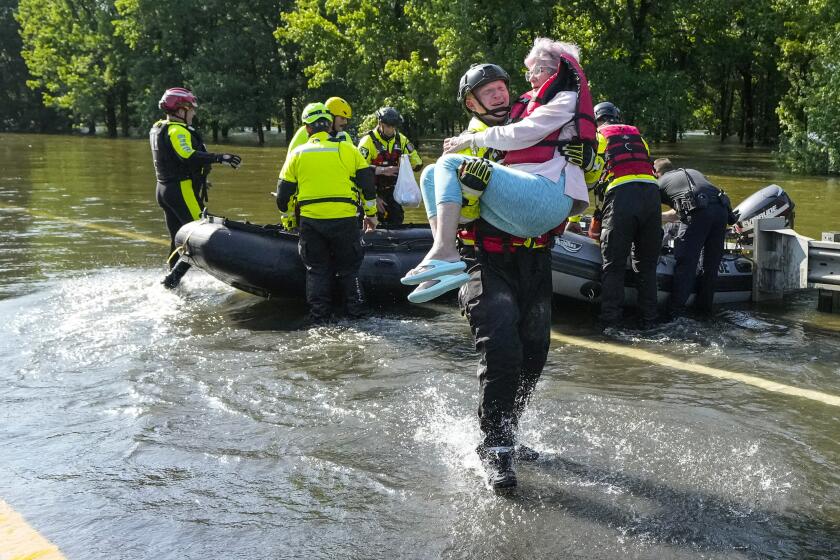Arab Issues Eclipse U.S. Agenda
U.S. efforts to launch an ambitious reform program across much of the Islamic world during the inaugural meeting of a forum of Western and Muslim nations were overshadowed Saturday by Arab concerns about outside meddling, the American-led war in Iraq and the Israeli-Palestinian conflict.
The Forum for the Future gathering unfolded here amid strong anti-Americanism throughout the Arab world, and the speeches of delegates from Muslim nations and the meeting’s final communique reflected a deep suspicion of the U.S.-inspired initiative. Although U.S. officials had insisted the Israeli-Palestinian issue should not be a part of the meeting, the communique said that “reform in the region will go hand in hand with ... support for a just, comprehensive and lasting settlement to the Arab-Israeli conflict.”
The same document asserted that reform “cannot be imposed from the outside.”
Despite this, Secretary of State Colin L. Powell said the fact that such a disparate group of nations had gathered for such a meeting made it a success.
“This has been an historic, very successful Forum for the Future,” he said at a closing news conference. He also assured his Arab counterparts that the United States was working for a settlement of the Palestinian-Israeli issue, but added, “We can’t ignore that reform has to go on.”
He said the group had agreed to hold a second meeting next year in Bahrain.
Representatives of Arab countries who addressed the forum, including several considered friendly to America, charged that the United States is biased toward Israel.
“We perceive no clash of civilizations or of competing values,” said the Saudi foreign minister, Prince Saud al Faisal. “Our differences are neither religious or cultural. The real bone of contention is the longest conflict in modern history. For too long the Arabs have witnessed the Western bias towards Israel.”
He warned that Western efforts to push reform too fast would “threaten the very stability we want to preserve.”
Libya’s deputy foreign minister, Hassouna Shawish, took direct aim at the United States, referring to “developments that hinder stability and peace in the region” before stating: “Continued bloodshed makes it difficult for us all. I’m talking about bloodshed in Iraq.”
Aside from brief opening remarks by Powell and Moroccan Foreign Minister Mohammed Benaissa, U.S. officials had said the meeting was to be private in order to encourage candor. But reporters were able to hear the delegates’ later remarks over an audio feed, and it was unclear whether the ministers were aware their comments were being aired publicly.
The statements reflected the anger toward America that has pervaded the region in the wake of the U.S.-led invasion of Iraq. An editorial cartoon in Friday’s editions of the leading Moroccan daily, L’Economiste, portrayed the meeting in the form of a heavily armed American soldier pointing his weapon at the head of an Arab lying on the ground.
The mood sharply limited the expectations of the session, which produced little more than a sprinkling of token initiatives.
A fund to assist small business ventures and private-sector start-up projects in Arab countries, initially expected to be backed by $100 million in seed money, ended up with only $60 million from industrialized nations and international finance institutions. Other economic programs approved included a Bahrain-financed initiative to strengthen capital markets and a Jordanian-Yemeni plan to provide so-called micro-credit, usually loans to individuals of several hundred dollars.
The only political reform initiative approved was an agreement among Turkey, Yemen and Italy to collaborate on a small program to promote greater participation by individuals and groups in shaping public policy.
American officials saw the forum as the first step toward a vision set out by President Bush of combating extremism and instability by helping to transform the Middle East and much of the broader Muslim world into an economically vibrant, democratic region.
Muslim nations taking part in the forum ranged from Morocco and Mauritania in the west to Afghanistan and Pakistan in the east. Israel and the Group of 8 industrial powers are also Forum members.
The organization aims to develop projects to promote education, literacy, private-sector investment and democracy. U.S. officials have said the forum was modeled after the Asia-Pacific Economic Cooperation forum, which after modest beginnings has blossomed into an effective group of Pacific Rim nations promoting economic development.
But there was strong resistance Saturday to democratic reform by leaders of a region dominated by autocratic regimes. There has been concern in the Arab world that the U.S. would attempt to use the forum to impose its political will on the region.
The Bush administration’s formal announcement of the initiative at a June meeting of leading industrial nations in Sea Island, Ga., was careful to cast the idea as a partnership of equals in which no country would be forced to undertake reform.
In his formal remarks to the opening session, Powell warned that change would not come quickly. “To defeat the murderous extremists in our midst, we must work together to address the causes of despair and frustration that extremists exploit for their own ends,” he said.
“Ours is a long-term task requiring a long-term commitment, extending generations.”
More to Read
Start your day right
Sign up for Essential California for news, features and recommendations from the L.A. Times and beyond in your inbox six days a week.
You may occasionally receive promotional content from the Los Angeles Times.






